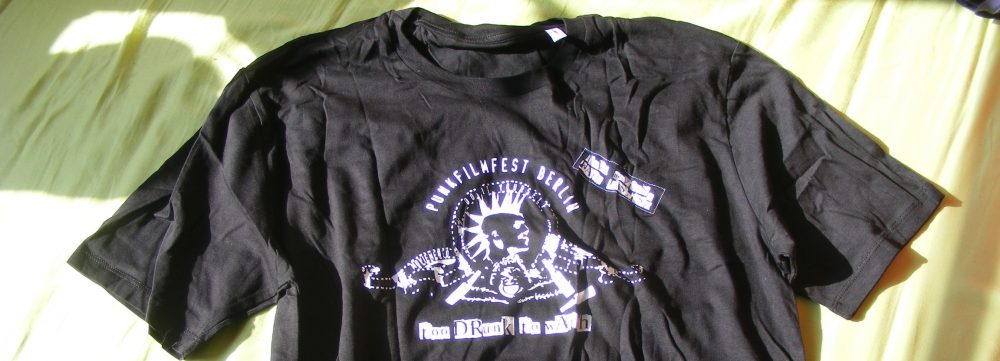GERMAN
Wahrscheinlich ist es ein Zufall, dass mit „No Fun City“ und „Bloodied But Unbowed“ zeitgleich zwei Dokumentarfilme über die kanadische Westküstenmetropole veröffentlicht wurden. Beschäftigt sich ersterer mit der Livemusik-Szene von Vancouver und ist durch die Aussagen zu den Auswirkungen von Gentrifizierung auf Subkukturen von weltweiter Relevanz, geht es in „Bloodied But Unbowed“ von Susanne Tabata um die Ursprünge und die Geschichte der Punk-Szene von Vancouver mit Schwerpunkt auf den Jahren 1977 bis 1982. Bands wie D.O.A., SUBHUMANS oder POINTED STICKS sind bis heute für an Punk Interessierte große Namen, aber man könnte argumentieren, dass im Vergleich etwa zu „American Hardcore“ der Fokus dieser Doku viel zu lokal ist, als dass der Film über die Stadt- oder Landesgrenzen hinaus von Bedeutung wäre.
Das ist falsch, denn Tabata ist es gelungen, in der Darstellung der Szene und ihrer Akteure (etwa Joe „Shithead“ Keithley von D.O.A. oder Gerry Hannah von SUBHUMANS) für Punkrock weltweit gültige Aussagen zu machen: In einer isolierten, spießigen Stadt „zwischen den USA und England“ Ende der Siebziger, verfolgt und verprügelt von den „normalen“ Jugendlichen, mit Freunden nur unter Angehörigen der Gay Community, entwickelten die Punks zwischen Protestverhalten, Provokation, politischem Engagement und Kunst eine eigene Identität. Das, so zeigt sie, war in Vancouver möglich, das ist, das war auch überall sonst möglich, und die Geschichten ähneln sich, wo immer auf der Welt man Punks befragt. Tabata kombiniert „historische“ Fotos und Filmaufnahmen mit jeder Menge Interviews mit Protagonisten der Vancouver-Szene und holte sich Aussagen von auswärtigen Zeitzeugen dazu, etwa Jello Biafra, Henry Rollins und Duff McKagan, und ihr gelang so ein kurzweiliger Film mit viel Musik.
(Rezesion von Joachim Hiller auf http://www.ox-fanzine.de/web/bloodied_but.1341.html)
ENGLISH
Bloodied But Unbowed chronicles the late 1970s/early 1980s Vancouver punk rock scene. Vancouver filmmaker Susanne Tabata’s documentary tells a tale of rebellion and music — a fiercely independent scene created from nothing and played out in a microcosm of urban squalor. Told by its surviving stars whose accounts are suffused with both humour and gritty realism — a distinctly Vancouver vibe. A brutally honest story from the streets and stages of the West Coast through interviews, music, photos, and archival performances. Overarching those halcyon days of poverty and excess is the MUSIC — that moved its audience to their feet and seemed to validate their very existence. (Source: http://thepunkmovie.com/about-documentary)
Press
BigTakeover online 11 Dec 2011
Bloodied But Unbowed DVD (Deluxe Edition) review by Jeff Nielsen
Director Susanne Tabata says she’s been working on her documentary Bloodied But Unbowed for over three years but from the look of it, Vancouver’s first punk scene has been ready for its close-up for the last thirty years. The film, released on DVD December 1st 2011, is made up of both reams of fascinating interview footage that Tabata has been shooting since 2008 and a treasure trove of period archival footage that come from early music videos, cable access shows, Hollywood feature films, amateur film enthusiasts, art students and the like. It’s difficult to imagine that any other North American late seventies/early eighties punk scene would have anywhere near this quantity (and quality!) of footage.
Exclaim! Magazine Dec. 2011 issue
Bloodied But Unbowed by Sam Sutherland
For fans of bands like D.O.A, the Subhumans and the Pointed Sticks, it will come as no surprise that Bloodied but Unbowed, a long-overdue documentary about the early Vancouver punk scene, is as good as its 2006 Stateside counterpart, American Hardcore. A slick, high-energy look at one of the most active punk and hardcore communities of the ’70s and early ’80s, Bloodied is every bit the film these unsung Canuck heroes deserve.
There’s an unexpected dose of humour here, as director Susanne Tabata works to capture all the angles that made Vancouver such a new wave hotbed, while the segment covering the K-Tels‘ Art Bergmann is particularly strong and touching, highlighting the damage that years spent in the punk trenches has done to some of its early participants. Ultimately, Bloodied is crucial viewing for any fan of the classic Vancouver scene, but offers enough context and brevity to engross anyone with a casual interest in Canada’s musical history.
